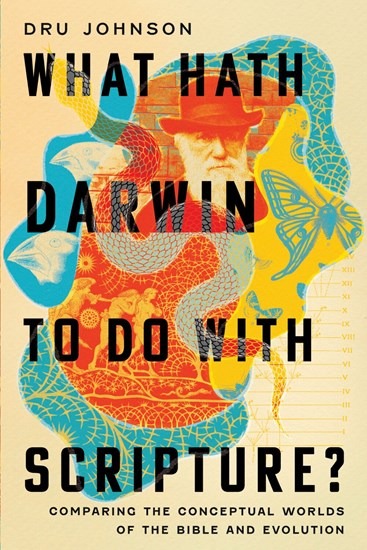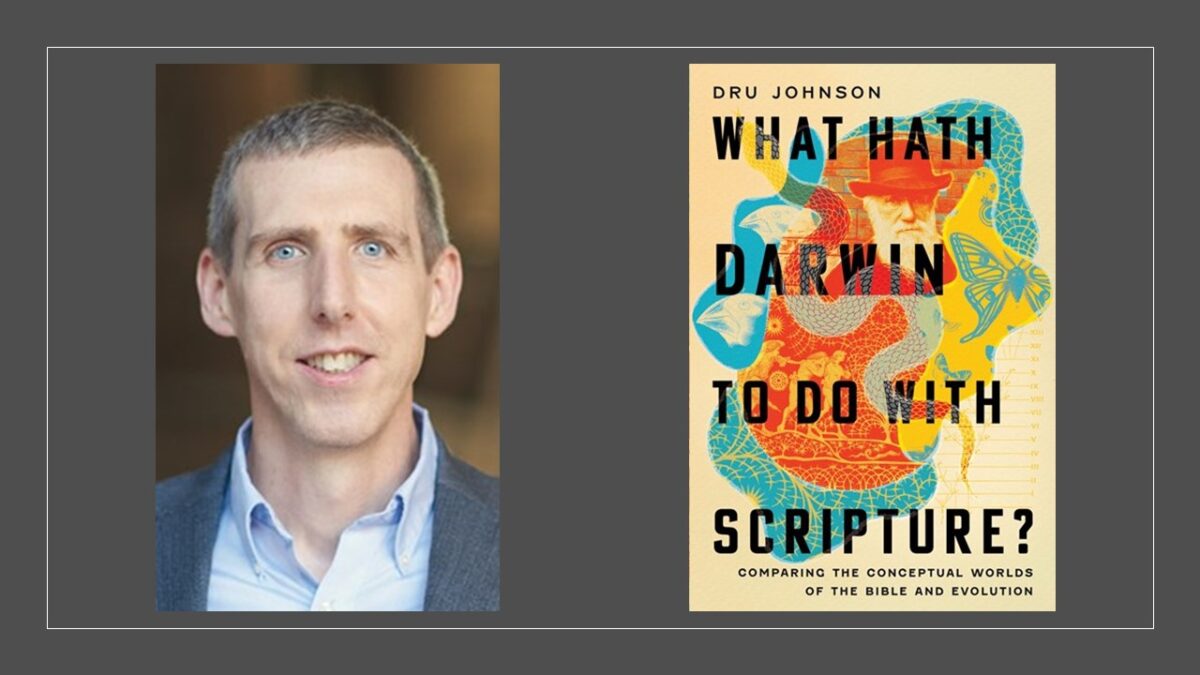
It’s Stanley Cup Finals time, and so I expect we are all asking ourselves the same question: How would you explain ice hockey to Bronze Age nomads from Canaan? Of course there will be a matter of translation. Words like “stick” and “net” presumably would map pretty directly. There’d probably be a word that shares meaning with “team” although maybe it would refer primarily to animals. “Offsides” is tricky to explain even to modern English speakers, but that’s because there are a lot of details; the constituent concepts are straightforward enough. My guess is the main sticking point would be the ice. To people for whom water is precious, it might be inexplicable that we would render so much of it unusable for consumption or irrigation purely for entertainment.
In What Hath Darwin to Do with Scripture?, Biblical scholar Dru Johnson undertakes a similar but likely more consequential task. He puts those nomads, or more specifically their intellectual heritage as represented by the Hebrew scriptures, in conversation with Charles Darwin and his intellectual descendants. To make that conversation fruitful, he looks for points of conceptual overlap. What themes, values and concerns would the authors of Genesis and subsequent texts find in common with the 19th century Victorian naturalist? The two parties don’t have to agree on all points; they just need to share topics on which they can both comment.
Johnson identifies three such topics: scarcity of resources, fit to surroundings, and generational continuity. The relevance of these to Darwin’s work should not be controversial. Johnson elaborates on the details so that the conversation has some substance, but he doesn’t have to build a case that Darwin was interested in those topics. The bulk of the work he has set out for himself is drawing out the threads of these themes in the book of Genesis first, and from there through the rest of the Old Testament and into the New Testament.
There’s probably a version of that exercise which a high school student could carry out using only the English text. “Compare and contrast how Biblical authors and Charles Darwin write about scarcity.” You might even get something passable using that as a ChatGPT prompt. After all, not having enough is sufficiently common to the human experience that you could probably spin something about it from a wide range of texts. As you can likely surmise, Johnson’s version goes much deeper. He identifies motifs in the original Hebrew that come up more often than is likely apparent just from reading English translations. Perhaps these linguistic motifs are more well known in his field of scholarship, but many were new to me. For example, I had not heard anyone identify the parallels around dirt between the curse in the Garden and the Flood in the way Johnson does. As a result, there seems to be some meaningful specificity to the idea that the Hebrew authors were concerned with these themes in particular, rather than Johnson cherry-picking them from a wide range of universal topics.

Johnson also makes several references to the idea that their authorial and cultural contemporaries were not as interested in these themes, if they addressed them at all. Hence the claim that “the book of Genesis might have been the most Darwinian text in the ancient world.” Here I expect that a greater familiarity than mine with the other works he’s referencing would be helpful. I have no reason to doubt his claims. But in just reading this book, it is easier to engage with the positive evidence he points out from the Bible than with what might not be in other texts. Are his readings in line with the consensus of scholarship on those other texts and the cultures that produced them? I’m content to grant that they are, but I cannot assess that issue independently.
I am somewhat more familiar with the science that is discussed. Johnson’s main concerns are not scientific, and again he doesn’t have to engage substantially with specific scientific results to be persuasive that Darwin wrote about scarcity, fitness and long-term reproductive success. Overall, I think the handling of biology is fine. It’s always nice to see discussion of how cooperation can be evolutionarily successful, when so often it is easy to fixate on competition. There is some frank discussion of the sexual dimorphism of humans and what implications that might have for the role of sexual violence in human history. That was challenging, but understandable as a discussion point given some of the narratives in Genesis. And I don’t think there’s anything to quibble with about the science.
I was a bit thrown by the repeated references to uncertainty, debate and speculation around the idea that asexual reproduction proceeded sexual reproduction. I’m not entirely sure what Johnson is getting at; even the earliest dates for the origin of eukaryotes leaves a billion years beforehand when bacteria were the only game in town, and as far as we know, bacteria only reproduce asexually. But this was a very minor point that I could have more easily ignored if it weren’t repeated in several places. Still, changing or dropping those mentions wouldn’t impact the substance of the discussion. And maybe someone can clarify for me what he thinks is up for debate.
Overall, it seems like Darwin and Hebrew authors of the Bible–and their intellectual kin–would have a lot to talk about. But how much would they agree on? Johnson stays away from the question of whether they would agree on the natural history facts of prehistorical life. Ultimately, however, he seems to land on a more abstract point of disagreement which might be functionally similar. The Hebrew authors operate from a perspective that the world was once ordered in a way that is distinct from its present disordered, post-Fall state. Darwin’s account, however, extrapolates the present state back well before human agency could be a factor. Johnson seems to allow for the possibility that this conceptual gulf is bridgeable, but I’m not sure how optimistic he is.
To me, this has a bit of the flavor of accepting microevolution but rejecting macroevolution that seems to be a popular line to draw for Christians. There is too much direct, observational evidence for microevolution at this stage to dismiss it without undermining the scientific process and/or some notion of philosophical realism. But prehistory is inaccessible enough for skepticism to feel safer. I don’t think that’s exactly the level of skepticism Johnson is embracing; I expect he seems himself as more agnostic than skeptical on prehistorical questions (based on his handling of the evolution of sexual reproduction, for example). And I imagine he’s probably right if he’s saying that the Hebrew authors of the Bible did not have in mind billions of years of prehuman pain and death before/outside of Eden. But if he sees a way to resolve that tension, it’s not in the book. Maybe he’ll elaborate in our chat tonight (details below), or maybe we’ll have to wait for the sequel.
Want to know more? There’s still time to register for a conversation about the book tonight (June 12, 2024) at 8pm EDT.

Believe it or not, the book of Genesis might have been the most Darwinian text in the ancient world. And throughout the opening books of Scripture, we find ideas that would also become prominent insights of the biologist Charles Darwin interlaced with the Bible’s one-of-a-kind origin story. Biblical scholar Dru Johnson calls us beyond typical creation-versus-evolution debates to explore the conceptual worlds underlying both Scripture and evolutionary science. He points toward remarkable continuities and discontinuities between the Bible’s central concerns and those of Darwin and modern science—ideas so fundamental that they can easily escape our notice.
Dru Johnson (PhD, University of St. Andrews) directs the Center for Hebraic Thought and has been a research fellow at the Herzl Institute (Jerusalem), Logos Institute (St. Andrews), and Henry Center (Trinity Evangelical Divinity School). He is the author or editor of numerous books, including Biblical Philosophy, Human Rites, and Knowledge by Ritual. He is ordained as an EPC minister and is cohost of the OnScript podcast.
Date and Time: June 12, 2024 08:00 PM Eastern Time
Andy has worn many hats in his life. He knows this is a dreadfully clichéd notion, but since it is also literally true he uses it anyway. Among his current metaphorical hats: husband of one wife, father of two teenagers, reader of science fiction and science fact, enthusiast of contemporary symphonic music, and chief science officer. Previous metaphorical hats include: comp bio postdoc, molecular biology grad student, InterVarsity chapter president (that one came with a literal hat), music store clerk, house painter, and mosquito trapper. Among his more unique literal hats: British bobby, captain’s hats (of varying levels of authenticity) of several specific vessels, a deerstalker from 221B Baker St, and a railroad engineer’s cap. His monthly Science in Review is drawn from his weekly Science Corner posts — Wednesdays, 8am (Eastern) on the Emerging Scholars Network Blog. His book Faith across the Multiverse is available from Hendrickson.

Leave a Reply